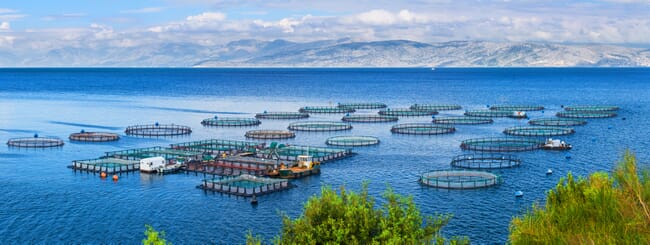
European consumers are uncertain about the pros and cons of aquaculture
Greenwashing, the dubious practice of exaggerating the environmental benefits of an industry, significantly undrmines consumer trust. In the case of aquaculture, misinformation and lack of information can lead to scepticism towards the industry and fewer people wanting to buy farmed fish.
This has been confirmed by a large online survey that we helped to deliver to consumers in five European countries.
Positive potential but room to improve
Farming fish and other marine organisms is an important part of global food security – helping to ensure that more people have physical and economic access to sufficient, safe and nutritious food – yet the industry also faces serious challenges.
In Norway, for example, it faces significant problems, such as sea lice and high mortality levels, yet the industry is often highlighted as a sustainable alternative to other animal proteins. Fish farming in EU countries also faces environmental challenges, including pollution and habitat degradation, making it hard to build trust in the sector.
Put simply: European consumers are concerned about what is perceived as greenwashing of the European aquaculture industry.
Full transparency is the only solution
We believe the responses to our survey underscore the need to rethink communication from the industry. Full transparency and credible communication seem to be the only solutions to improve trust in the aquaculture industry.
And there is a way to get there.
In the online study we conducted together with colleagues from the University of Bologna in Italy, we asked 2,500 participants from the United Kingdom, France, Spain, Germany, and Italy about their perceptions of the European aquaculture industry.
The study identified the following three different consumer segments, based on their perceptions of greenwashing in the aquaculture industry.
- The unimpressed: individuals who are very sceptical of the sector’s green claims. They were often confused and perceive information from the aquaculture industry as risky. However, despite their scepticism, they show relatively high trust in the industry.
- The trusting: the smallest segment of respondents was characterised by high levels of trust and low levels of scepticism. These consumers showed positive attitudes towards all aquaculture systems and are likely to accept most green claims.
- The uninformed: most of those surveyed turned out to have low awareness of, and moderate trust in, the aquaculture industry. They were less positive towards the industry and showed scepticism towards new technologies, like RASs and IMTA.
Improving trust and acceptance
The EU has already introduced measures to combat greenwashing and protect consumers from misleading environmental claims. Key provisions include:
- A ban on unsubstantiated claims: general environmental claims must be supported by evidence.
- Sustainability labels must be based on recognised certification schemes or introduced by public authorities.
By increasing consumer awareness and providing balanced, science-based information, we believe that the aquaculture industry can improve trust and acceptance of how its is operating.
Policymakers and industry actors must work together to promote sustainability and transparency, ensuring that aquaculture continues to contribute to global food security.
Policymakers can use the findings from the study to develop targeted regulations and communication strategies to combat greenwashing. By addressing consumers’ concerns, they can promote a more sustainable and resilient aquaculture industry.
Industry actors can benefit from understanding how consumer perceptions influence their decisions, allowing them to adapt measures to build trust and acceptance.
More information
For more information on sustainable aquaculture and greenwashing, you may consider the following relevant articles:

